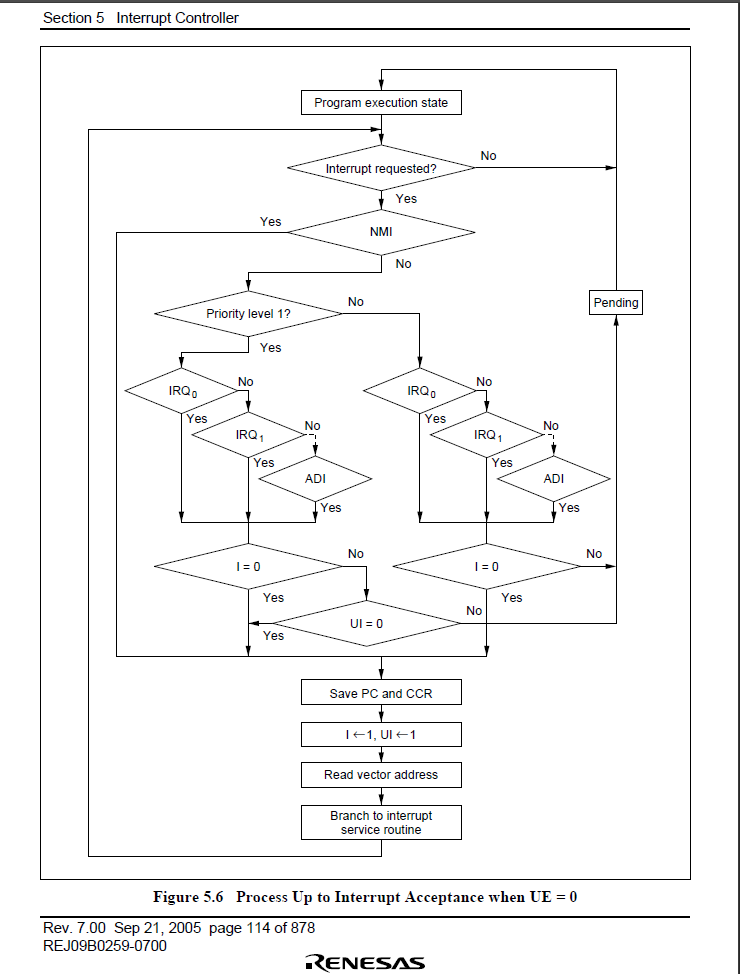Use Interrupt Priority to Enable Nested Interrupt Handling for H8/300H
Problem Description
- SCI0 (UART) lost receiving data frequently, with baudrate 19200.
Analysis
- System have more than one timer interrupt handling that might prevent SCI0 interrupt handling in time.
Interrupt Background of H8/300H
- CCR: Condition Code Register
-
Bit 7Interrupt Mask Bit (I): Masks interrupts other than NMI when set to 1. NMI is accepted regardless of the I bit setting. The I bit is set to 1 at the start of an exception-handling sequence.
-
Bit 6User Bit or Interrupt Mask Bit (UI): Can be written and read by software using the LDC, STC, ANDC, ORC, and XORC instructions. This bit can also be used as an interrupt mask bit. For details see section 5, Interrupt Controller.
-
- Table 5.4 UE, I, and UI Bit Settings and Interrupt Handling
| UE(SYSCR) | I(CCR) | UI(CCR) | Description |
|---|---|---|---|
| 1 | 0 | - | All interrupts are accepted. Interrupts with priority level 1 have higher priority. |
| 1 | 1 | - | No interrupts are accepted except NMI. |
| 0 | 0 | - | All interrupts are accepted. Interrupts with priority level 1 have higher priority. |
| 0 | 1 | 0 | NMI and interrupts with priority level 1 are accepted. |
| 0 | 1 | 1 | No interrupts are accepted except NMI. |
- Interrupt Handling with UE = 0

- Nested Interrupt Handling
-
Setup:
SYSCR.UE= 1(EnableUE),IRPB.B3= 1(SCI0 at high priority). Timer interrupt use the interrupt priority 0(low) by default. -
Timer handler:
setCCR.UI= 0 at first line. This will enable nested interrupt for high priority interrupt.
CCRis not a regular register that can be accessed in c language. We can use assembly code to set or clear it. See the example below.
-
Solutions
Settings
- Set SCI0 at high priority
// priority SCI0 at high
IPRB |= 0x08;
- Enable UE, so that UI of CCR function as interrupt mask
// SYSCR clear UE, BIT 3, UI in CCR is used as interrupt mask
SYSCR &= ~0x8;
Lower Priority Interrupt Handlers
- At timer handlers, add the following instruction at first line. For example, Timer0 handler is defined as
void DoTimer0Handler(void)
{
__asm("ANDC.B #191,CCR"); // UI(CCR bit 6) = 0
...
}
or (depending on available compiler options)
void DoTimer0Handler(void)
{
asm("ANDC.B #191,CCR"); // UI(CCR bit 6) = 0
...
}
If no asm or __asm available, define it as a public function with assembly language. And call it at the first line of timer handler
public clearUI
clearUI:
ANDC.B #191,CCR
RTS
extern clearUI(void);
void DoTimer0Handler(void)
{
clearUI();
...
}